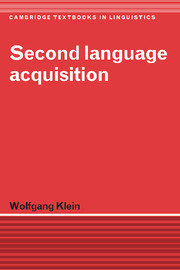PART I - The process of language acquisition
Published online by Cambridge University Press: 05 June 2012
Summary
This part comprises three chapters. The first offers a panoramic view of language acquisition research. Various types of language acquisition are considered, some fundamental facts are stated, a number of issues which have been the focus of discussion in recent years are reviewed, and several important theories are outlined. This overview is not meant to be complete; rather, it should give the reader an idea of what researchers in second language acquisition were mainly concerned with during the past decade. It also includes a brief look at other forms of language acquisition. Although this book is essentially devoted to second language acquisition, the subject matter itself as well as the way in which the research field has developed over the last fifteen years make it imperative to consider the problems in a broader framework.
It is not easy to convey a picture of the state of the art in second language research, given the heterogeneity of issues, research methods, interpretations, and, last but not least, of terminology. An attempt is made in the second chapter to impose a uniform – psycholinguistic – perspective on this complex field. From this perspective second language acquisition appears to be a process which
exhibits certain regularities,
is constrained by a number of factors determining its course, rate of progress, and final outcome,
is subject, within certain limits, to external influences such as (methods of) instruction.
- Type
- Chapter
- Information
- Second Language Acquisition , pp. 1 - 2Publisher: Cambridge University PressPrint publication year: 1986



